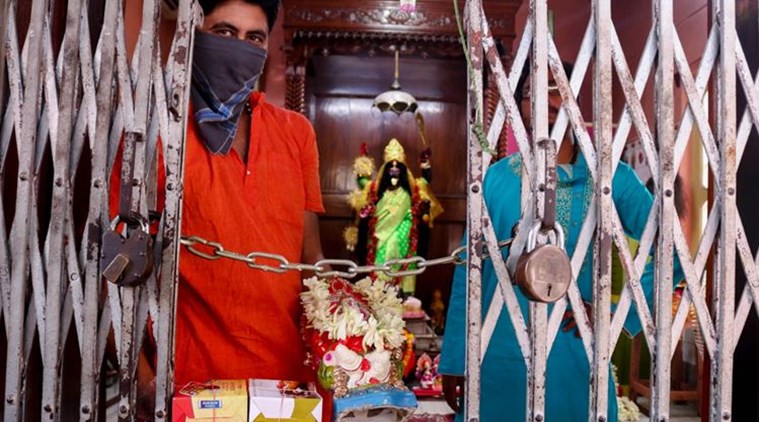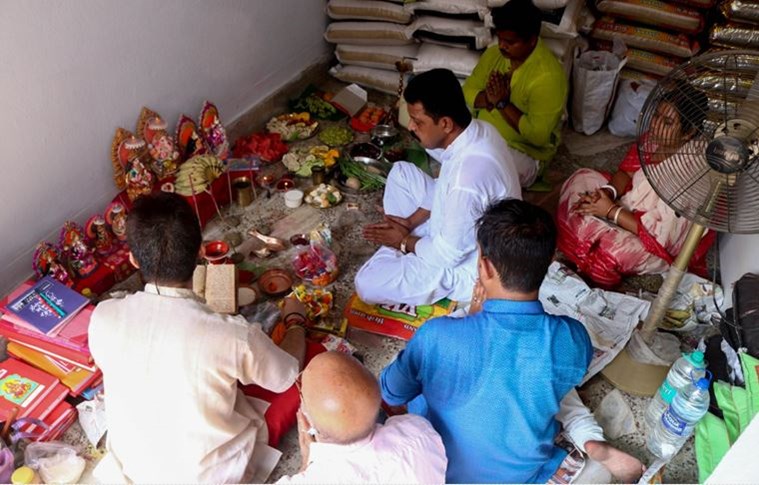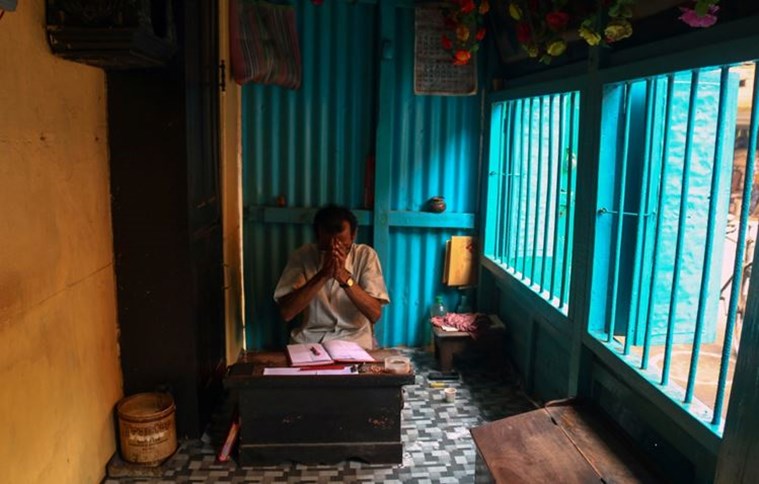 Some priests feel they have been forgotten by the very people who find them indispensable at all important occasions of their lives. (Photo: Shashi Ghosh)
Some priests feel they have been forgotten by the very people who find them indispensable at all important occasions of their lives. (Photo: Shashi Ghosh)
The unorganised sector of priests in the Kolkata metropolitan area has witnessed a complete halt in its earnings since the COVID-19 lockdown started on March 24.
“When I first heard about the lockdown, it impacted my mental health. We are really suffering,” said Gautam Chakraborty, a city-based priest.
Chakroborty is, however, among the more fortunate priests. Like many of his colleagues in the city, he is not entirely dependent on the profession for survival. When he isn’t working as a priest, Chakroborty reads astrology charts and has managed some savings over the years.
“Many priests do other jobs as it is not possible to earn enough only through rituals. Besides, we don’t have fixed rates for our services. Those who are wholly dependent on this profession for their earnings are facing more problems,” said Prasenjit Mukherjee, committee member of the Paschim Banga Rajya Sanatan Bhraman Trust, one of the largest organisations of priests in West Bengal.
In South 24 Parganas, the organisation alone has 13,646 priests as members. Mukherjee believes the total number of priests in the district would be significantly higher.
The occurrence of several festivals in March and April ensures that priests are able to make a significant amount of earnings, all of which have stopped after the lockdown. Temples are shut and rituals that would happen at home have also stopped. Weddings, which are a source of good income for the priests, scheduled in April, have been indefinitely postponed.
“Many people are afraid to call us to their homes and we are also afraid to go to theirs because of infection concerns,” said Chakraborty. “I am able to eat only thanks to my savings.”
To add to the problems, some Hindu rituals require the presence of two to three priests, and in the lockdown, even if one priest manages to reach the designated location, others may not in the absence of public transport, said priests interviewed by The Indian Express.
 Some rituals require the presence of two to three priests, a requirement difficult to meet during the lockdown. (Express photo: Shashi Ghosh)
Some rituals require the presence of two to three priests, a requirement difficult to meet during the lockdown. (Express photo: Shashi Ghosh)
“There is nothing we can do. I used to work in a private firm and I became a priest after I retired. I am paying for son’s college education from my pension, and I am using my savings right now. I am eating once a day,” said Jagannath Mukherjee, 60, a priest based in the Jadavpur, who has been practising for five years now.
Mukherjee said during the month of April, his earnings depend on Poila Boishak, the Bengali New Year. With celebrations muted this year, he does not have any jobs lined up. “Priests have no fixed earnings. On Poila Boishak, we earn approximately Rs 2,000 to Rs 4,000. During some other months, we earn more,” said Mukherjee. Along with the earnings, priests are given fruits, clothes and household items as tokens. Those too have stopped now.
Within days of the lockdown, the Kali temple at Kalighat in Kolkata, one of the most popular temples in West Bengal, closed down, as did the several hundred shops surrounding it. Many of the innumerable priests who can usually be found in the temple’s vicinity were compelled to return to their villages. Local priests have also been sitting at home.
“Priests and staff appointed by the Kalighat temple committee are looked after by the temple committee. Security guards, staff, priests and the temple cooks are working inside and daily prayers are still held, but the temple is closed to visitors,” said Tapas Halder, a Kalighat temple sevahit, a term used for families who have been custodians of the temple for generations.
Meanwhile, the seven government-run crematoriums in the Kolkata metropolitan area and the associated support staff, including priests, have been working as usual. “Many priests stay close by. Those who live at a distance have been given essential services pass,” said an employee at the Shanagar cremation ground.
 Some people are asking priests to perform rituals at their own homes instead of coming to theirs, but are then paying only half the usual rates. (Express photo: Shashi Ghosh)
Some people are asking priests to perform rituals at their own homes instead of coming to theirs, but are then paying only half the usual rates. (Express photo: Shashi Ghosh)
Last year, the Kolkata Municipal Corporation began paying the priests Rs 380 for conducting the last rites for each cremation. According to figures given by the civic body last year, 49 priests are associated with the seven crematoriums in the city, who perform the last rites for approximately 350 bodies every day. The Shanagar cremation ground employee told The Indian Express that the priests have been paid their March salaries.
“I have been a priest for 34 years and I have never seen anything like this. This is akin to losing our jobs,” said Chakraborty. Some people have been paying Chakraborty to do important rituals in his own house instead of having him come over to their residences, but then he gets paid half his usual rates. “I am not blaming people. I understand their fear. But not many have thought about us,” he added.
This sentiment is common among other priests interviewed by The India Express. The issue, some said, was the lack of one consolidated organisation to take their grievances to the government. Others feel they have been forgotten by the very people who otherwise find them indispensable at all important occasions of their lives.